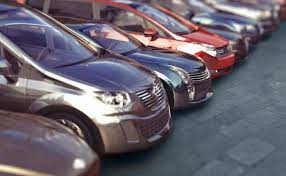Dealing with bankruptcy is difficult, and it’s almost impossible to obtain a car loan with bankruptcy. Thankfully, some car dealerships still work with bankruptcies, and in this article, we have listed such car lenders, with the pros and cons of working with each.
Car Dealerships That Work With Bankruptcies
Buy Here, Pay Here Dealerships (BHPH)
BHPH dealers are one of the car dealerships that work with bankruptcies. They are distinct from regular dealerships in that they also serve as your lender. This is known as in-house finance. In this case, the dealer would be the one reviewing your credit reports because they handle the finance and the automobile purchase, although they do not generally analyze your credit reports. This means that your bankruptcy may be irrelevant to the dealership. Why? because they do not use your credit history to determine your eligibility to obtain an auto loan.
In-house financing is a frequent technique for consumers with bad credit to secure a car loan after filing for bankruptcy.
While the absence of a credit check appeals to many bankruptcy applicants, there are some drawbacks. BHPH dealers typically charge higher-than-average financing rates and may need a down payment of approximately 20% of the vehicle’s selling price. Because these dealerships do not check your credit reports, your loan may not be recorded to the credit bureaus. If credit rehabilitation is crucial to you, double-check the dealer’s reporting policies before signing the papers.
If your bankruptcy did not go smoothly, or you have significant damage on your credit reports, a BHPH dealership may be the route to go for your next vehicle.
Advantages of Buy-Here, Pay-Here Car Dealerships
#1. There is no credit required.
The ability to purchase a car with no or terrible credit is a significant advantage of buy-here, pay-here financing.
#2. Getting an automobile is simple.
Getting finance from the seller allows you to buy a car quickly and easily.
#3. They will accept older trade-ins.
This type of lot frequently sells cars in poorer condition than typical dealerships. Thus, they may be more prepared to accept an older car in poor condition.
Disadvantages
#1. Excessive interest rates
These vehicles frequently have interest rates of around 20%. That’s comparable to what you’d spend on a credit card and four to five times what you’d pay on a regular auto loan.
#2. They track your vehicle.
Due to the high likelihood of default and repossession, almost two-thirds of these dealerships require a car tracking device.
#3. Unusual payment obligations
Many of these loans necessitate monthly or even weekly installments. And those payments are frequently required to be made in person.
#4. May not report to credit bureaus
Many buy-here, pay-here loans do not appear on your credit report and hence do not improve your credit score.
#5. Limited vehicle choices
Instead of selecting a vehicle and then determining finance, this type of dealer may examine your financing first and then present you with a limited selection of vehicles to pick from.
#6. Significant down payments
Higher down payments result in reduced payments over the life of the loan. However, large down payments may be required, which may be difficult for low-credit customers.
Special Finance Car Dealerships
This is also one of the car dealerships that work with bankruptcies. The majority of dealerships have agreements with third-party lenders to finance clients, and those with negative credit lending capabilities are referred to as special finance dealers. These dealerships are distinct in that they have partnered with lenders who take into account more than just your credit reports when you apply for vehicle finance.
A specific finance manager at the dealership operates as a go-between you and the lender. You don’t actually meet the lender, but they review all of your information – credit reports, pay stubs, residency, and employment stability – and need a down payment. If you are approved for financing, you will work with the dealership to select a vehicle and finish your contract.
Advantages
There are several benefits to using special finance dealership. Let’s have a look at a few:
#1. Profit from financial opportunities.
One advantage of using dealer financing is that you can benefit from a cheap initial interest rate. For example, the manufacturer may provide 0% financing for the first year. Of course, you should check the fine print on these offers, but if everything appears good, you’re in business!
#2. You are not bound to the agreement
This is true for any finance deal that culminates in you purchasing an automobile. While you are obligated to pay your car notes on a monthly basis, you may always refinance if you are dissatisfied with the arrangement you reached with the auto dealer.
Disadvantages
#1. Auto dealers aren’t out to get you a good deal.
One reason you could avoid dealer financing is that the dealer’s aim is to get you to spend the most money possible for a vehicle, not to get you a decent bargain. So often, you are led to a vehicle that is too expensive for you because the dealer wants to work up a “deal” that will have you pay for the car for 6 or 7 years, or your interest rate may increase after a year or two.
#2. There may be additional charges
Another problem is that they cooperate with their own finance businesses to make money. This means that you may not only be informed you qualify for the lowest of a slew of ridiculously expensive rates, but the dealer may also include some additional hidden expenses in your finance contract. To avoid this, it is critical that you thoroughly study anything you sign.
The Credit Union

Banks and credit unions are considered traditional lenders because they provide direct auto loans. They work directly with you and have varied credit standards, some more stringent than others.
Because they are member-owned, credit unions are often more liberal than banks. However, if you have a bankruptcy on your credit history, it may be difficult to qualify. Nevertheless, if you’ve been a member of a credit union for a long time and have an excellent history with them, they may be willing to finance you.
When you get approved for a direct vehicle loan from a credit union, it’s usually regarded as a pre-approval, and you may take that to a dealership and shop as if you were paying cash. Your bankruptcy is irrelevant to the dealer because you have a pre-approval letter from a lender and are ready to buy a car.
Advantages
#1. Reduced interest rates
Credit unions can provide lower rates since, unlike most banks, they are not for profit. As a result, car loan originations are increasing at an exponential rate.
“Under most conditions, the rate of the loan (at credit unions) is fairly competitive compared to other lenders,” says Bill Meyer, public relations and content manager at CU Direct, which connects credit unions with auto dealers around the country.
According to the NCUA, the average rate on a five-year new car loan from a credit union was 2.78 percent in the first quarter of 2022. It was 4.69 percent in banks. If you borrow $30,000 for a car, the credit union will save you $1,545 in interest during the loan’s term.
#2. Community connections and personalized service
The process of obtaining a car loan differs little between banks and credit unions. However, if you have a worse credit score, you may be able to apply for an auto loan through a credit union rather than a bank.
“Credit unions are likely to have more flexibility in the underwriting process,” says Mike Schenk, a trade association’s deputy chief advocacy officer for policy analysis and chief economist.
Credit unions are also more willing to work with you if you are experiencing financial difficulties and require additional time to make a payment.
“You have a unique story, and it is much more likely that your story will be heard at a credit union.” Large financial institutions are more likely to have predetermined underwriting done in a corporate office a few states away. If you walk into a credit union, you’re more likely to strike up a conversation.”
#3. A simple loan application process
The days of having to visit a bank to apply for a car loan are long gone. Most credit unions now allow you to apply online, by phone, or in-person at the dealership.
If you apply for financing at a dealership, Schenk adds, “invariably, the dealer can recommend you to credit union financing and a credit union you can join as a member,” making the process “very simple.”
However, before visiting the dealership, you should apply with the credit union. Not all dealerships cooperate with credit unions. If you can become a member, you will most likely get the greatest bargain when dealing with the credit union directly. Plus, when you go car shopping, you’ll already have a competitive loan offer in hand and won’t have to pay a dealer markup on your rate.
#4. Credit unions provide numerous other advantages.
Credit unions are owned by members rather than shareholders, and any earnings are distributed to members in the form of dividends. They can also pass on revenues to their members by offering greater interest rates on deposit accounts and reduced interest rates on loan items such as auto loans.
Most credit unions are also members of a shared branch and ATM network. According to Schenk, CUNA members have a shared ATM network with about 40,000 outlets.
Credit unions are also focused on educating their members. And so, you may get guidance on the best financial solutions for your situation. “Credit unions are full-service institutions that offer the same products as banks.” “They’re basically structured differently, which leads to huge benefits for credit union members,” adds Schenk.
#5. Becoming a member is simple.
Some individuals believe that credit unions are solely open to persons who work for a specific firm, industry, or government agency, and that anyone who is not a member of that group cannot join. According to Meyer, this is no longer the case. “Most credit unions welcome new members.”
CUNA has credit unions with community charters that allow them to service greater geographic areas.
#6. Auto loans are a significant component of what credit unions do.
Don’t be surprised if your car salesman recommends a credit union over a bank.
According to NCUA data, credit union loan originations for new automobiles declined 0.1 percent in the fourth quarter of 2021, but used-car loans increased 10.3 percent, for a total rise of 6.4 percent. At the conclusion of the fourth quarter of 2021, credit unions had $142 billion in loan balances for new vehicles and $262.5 billion in loan balances for used cars.
In Conclusion,
Dealing with bankruptcy is difficult, and it can be difficult to find a lender willing to work with you if you have one on your credit reports and your credit score has plummeted.
While many traditional vehicle lenders may be wary of working with bankruptcy customers, you may have more lending options than you realize. Dealers aren’t very concerned with whether or not you’ve filed for bankruptcy because they aren’t the ones who approve vehicle loans. We have provided the names of car dealerships that work with bankruptcies in this article, including the pros and cons of working with each of them, and we hope that you’ll be able to choose what works best for you.






